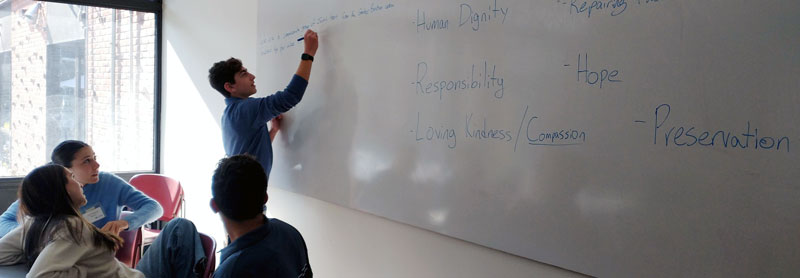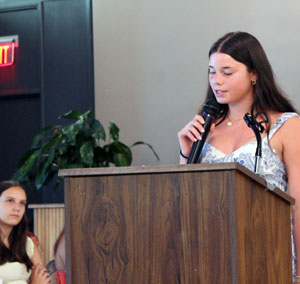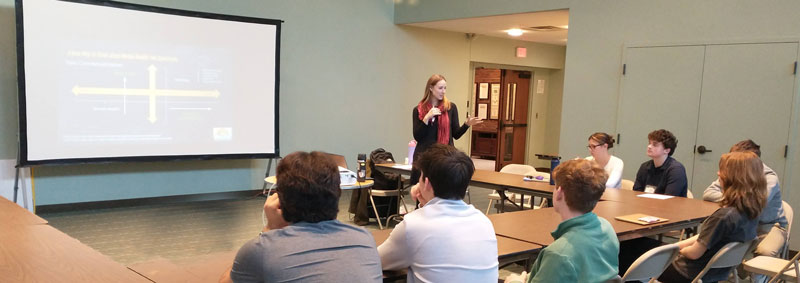Jewish learning Jewish Teen Philanthropists Rise to the Occasion in Hard Times

The Jewish Teen Foundation of Greater Boston (JTFGB) of Hebrew College Supports Youth Fundraising for Mental Health and Housing Crises in the United States and Israel
When Maya Rottenberg first heard about the Jewish Teen Foundation of Greater Boston (JTFGB) in eighth grade, she was excited hone her skills for fundraising for causes she believed in, taking pride to live out her Jewish values like tzedakah, tikkun olam, and achrayut. Rottenberg, now a junior at the Noble and Greenough School in Dedham, MA, had no idea that once she joined JTFGB, the organization would need to pivot its operations to respond to the current world situation at the time, COVID-19.
Rottenberg and other Jewish teen leaders in the foundation rose to the occasions to address the challenges that COVID-19 posed for communities throughout the world, raising nearly $60,000 for nonprofits working for education equity and adolescent mental care, two areas deeply affected by the COVID shutdowns in schools and workplaces.
Currently in her fourth year at JTFGB, serving in the leadership council, Rottenberg and her fellow JTFGB teens have found themselves once again needing to pivot their work to respond to world crises. Since the devastating October 7 terrorist attack in Israel, the ensuing Israel-Hamas war, and rising antisemitism throughout the world, Jewish teens have become acutely aware of the pain and trauma felt deep in their community. This year, both JTFGB teen fundraising boards have decided to allocate a committed amount of funds to support Israelis in two focus areas. One is the housing crises for those who lost their homes on October 7 or had to evacuate due to rocket attacks. The second addresses mental health crises for Israelis of all ages and backgrounds who witnessed horrific violence and loss.
In the face of tremendous challenges, the JTFGB teens have once again responded to the moment, seeking to support work that will improve lives, safety, and wellbeing in very difficult times.
“Each year the experience changes as a new focus is chosen. In the first three years, my board chose to focus on the areas of education inequity, adolescent mental health, and natural and humanitarian disaster. Each of these selected areas reflect what we felt was a pressing issue at that time,” Rottenberg said. “Education inequality and adolescent mental health felt especially important with the world shutting down due to Covid-19, natural and humanitarian disaster felt important given the Russia-Ukraine war, and this year, the issue of housing felt particularly important because of the Israel-Hamas war and Israeli people losing their homes or needing to leave their homes in order to stay safe.”
As the JTFGB high school fellows learn about philanthropy and putting their Jewish values into practice, they also gain in-depth experience in the work of fund-raising with a committee.
“In order to choose our issue area each year, we learn about the importance of finding consensus,” Rottenberg explained. “Every member of the group is asked to share three issue areas that feel important to them. We then write these out on paper and hang them up on the wall. Through several rounds of sticky notes and lengthy discussions, we eventually reach a point where everyone likes, or is comfortable working with the issue area chosen.”
The JTFGB program offers its fellows the opportunity to engage in issues they are passionate about as they also cultivate fundraising skills with a board, learn to assess community needs, strengthen teamwork and leadership skills, work closely with nonprofits and expand their perspective.
For Erika Hicks, a senior at Buckingham Browne and Nichols School in Cambridge, MA, a sense of empowerment inspired her to commit a third year in the program on its leadership council. To Hicks, the learning continues with each year of involvement, as she and her fellow fundraisers acquire skills and an awareness of the world of philanthropy. Hicks, and the 13 other members of her teen board, like Rottenberg, were concerned about the situation in Israel and similarly adapted their fund-raising goals to support mental health care for Israeli survivors.
“This is now my third year, and after my first year I was so inspired by the vast amount of money such a few teens raised, and I wanted to be a part of making a difference in issue areas I cared about,” Hicks said. “My board is ensuring we donate to an Israeli organization relating to mental health. Our issue area of mental health applies drastically to Israel in this current situation as so many Israelis are inevitably facing new mental challenges that won’t go away on their own and will last beyond the war.”

Bridget Connor-Feldbaum, Director of JTFGB at Hebrew College as well as Director of Youth Engagement at our shared campus partner Temple Reyim, has served as a Jewish educator for years, and supports teens as they conduct projects with real world impact.
“JTFGB teens are not just learning about issues they’re passionate about, they’re actually raising money and giving grants that make a real difference. I think the type of teens that JTFGB attracts are teens that really want to take their values and put them in action making a real difference,” Connor-Feldbaum explained.
Connor-Feldbaum continues to learn from the teens too. One of her favorite past causes that the teens have raised funds for was the Search Dog Foundation, a disaster relief organization that trains dogs for search-and-rescue operations.
“They pair rescue dogs with a first responder like a firefighter, and they train them to save people who are trapped in disaster situations. To me, that was a completely new organization. And it was a really different way of thinking about disaster relief. But these dogs are much more efficient at finding people quickly. So, the chances of finding survivors really increases,” Connor-Feldbaum said. “Through the program, they learn about issues, what nonprofits are, and the grant process. But they also get to learn about cool organizations that have innovative ways of solving these problems.”
One hundred percent of funds raised by JTFGB teens goes directly to grants for the nonprofits they support. The participation fee for students is set at an accessible level, and there is financial support available for lower income participants. The program expenses are reliant on donors to support the teen-led program. In addition to outside donor support, the Advisory Council, comprised of parents as well as leaders in the nonprofit world, supports the work through convening to advise the program, find guests speakers, and develop the curriculum to empower and support the teen teams. This support along with monthly program donors support the program costs and logistics that empower teens to do their own philanthropic work.
“I think quite simply JTFGB could not operate without its donor support. The more support the program has, the more students we can bring in, the more recruitment, and finally more nonprofits we can support,” Rosa Franck, Director of Development at Hebrew College said.
Rottenberg said the direction of her future has been shaped by involvement in JTFGB, as she has engaged more deeply in putting values into practice through philanthropy.
“There are not many organizations that teach teenagers about philanthropy, fundraising, and consensus. JTFGB enables us to learn these skills while encouraging us to use our Jewish values through the entire process, from, learning to write a board mission statement, researching nonprofits, and reading grant proposals to fundraising. It makes a big difference in our lives and the lives of those whose work we can support,” Rottenberg said.


